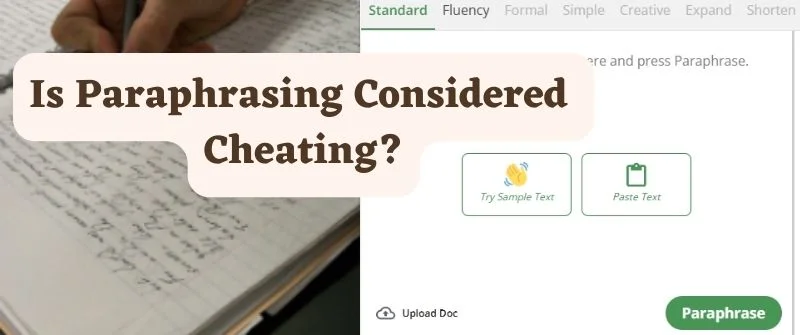Students frequently use paraphrasing to include material from outside sources in their work. However, it is frequently unclear if paraphrasing is regarded as cheating.
Although paraphrasing can be a useful tool for avoiding plagiarism, it is crucial to realize that only altering a few words or sentence patterns will not make the content unique.
In this response, we will look at paraphrasing, when it is acceptable to use, and when it can be considered unethical.
Is Paraphrasing Considered Cheating?
Students always want to make their sentences unique. However, some lack the methods to apply for them to paraphrase the sentences without altering their meaning.
Paraphrasing is not considered if one does it well and cites the source of the information to give credit to the author. It is not cheating because regarded as a respectable writing technique used to incorporate material from outside sources into one’s work. However, when done incorrectly by imitating the source, and not properly cited, paraphrasing is deemed to be an act of cheating.
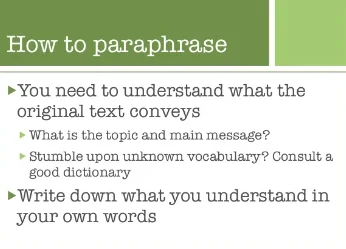
It is critical to remember that paraphrasing involves more than just modifying a few words or sentence structures.
It also calls for a solid grasp of the original source material and the ability to paraphrase it in a way that shows creative thought and analysis.
In order to avoid plagiarism, proper reference and attribution are also essential.
Also, one should avoid copying the source or closely imitating its language and structure, paraphrasing can be seen as cheating.
Instances when Paraphrasing is Considered Cheating
Paraphrasing is cheating when the writer fails to properly cite the original source or when the paraphrasing is poor and does not accurately reflect the original meaning. Additionally, using paraphrasing as a way to replace a few words or rearrange the sentence structure without truly rephrasing the original text can also be considered cheating. Here are instances when it is cheating:
1. Poor Paraphrasing
Paraphrasing is useful for writers who want to present someone else’s ideas in their own words. However, when paraphrasing is done poorly, it can lead to accusations of cheating.
Poor paraphrasing occurs when the author changes only a few words or rearranges the sentence structure but does not truly rephrase the original text. This can make it difficult for the reader to determine whether the text is original.
2. Failing to give Credit to the Source
Another instance when paraphrasing can be considered cheating is when the author fails to give proper credit to the source. This can occur when the author paraphrases information from a source but does not cite the source in the text.
Failure to give credit can be intentional or unintentional, but it can lead to accusations of plagiarism.
3. Copying the Original Structure and Ideas
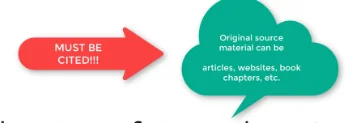
Paraphrasing can also be considered cheating when the author copies the original structure and ideas of the source text.
Even if the author uses different words, if the sentence structure and ideas are the same as the original, it can still be considered plagiarism.
In academic writing, it is appropriate to present original ideas and structure, even when using sources to support those ideas.
4. Submitting someone else’s paraphrasing as your work
Finally, submitting someone else’s paraphrasing as your own work is also considered cheating. This can occur when a student asks someone else to paraphrase a text and then submits it as their own work.
It can also occur when a writer purchases a pre-written essay or paper that includes paraphrased content from other sources. In both cases, the writer presents work that is not their own and can face serious consequences for cheating.
Instances when Paraphrasing is not Cheating
1. Using Paraphrasing to Clarify complex ideas
Paraphrasing can be useful when trying to explain complex ideas in simpler terms. By restating the information in a way that is easier to understand, the writer can help their readers better comprehend the material.
2. Incorporating Information from Multiple Sources
When writing a research paper, drawing information from multiple sources is often necessary. Paraphrasing can help the writer integrate the information from various sources into their writing while still maintaining their voice and style.
3. Summarizing Lengthy Passages
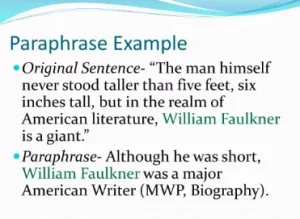
In academic writing, it is often necessary to summarize lengthy passages to present the information more efficiently.
Paraphrasing can help the writer condense the information without losing the important details.
4. Paraphrasing with proper citation
When paraphrasing, it is important to properly cite the original source.
When the writer cites the source of the information they have paraphrased, they give credit where credit is due and avoid accusations of plagiarism.
Does Paraphrasing Count as Plagiarism?
Paraphrasing itself does not count as plagiarism, but poor paraphrasing can lead to unintentional plagiarism. If a writer replaces a few words or rearranges the sentence structure without truly rephrasing the original text, it can still be considered plagiarism. Additionally, if the writer fails to properly cite the original source when paraphrasing, it can be considered plagiarism.
It is good to note that when you plagiarize you cheat, and that comes with repercussions. Therefore, it is advised to check your similarity score. You can use free plagiarism scanners to know your similarity score.
Proper citation is important to avoid plagiarism accusations and give credit to the original source. When done correctly and ethically, paraphrasing can be a useful writing tool.
Is Avoiding Plagiarism through Paraphrasing good?
Paraphrasing as the sole method of avoiding plagiarism may not be enough, as there are other important aspects to consider, such as proper citation and avoiding self-plagiarism.
Avoiding plagiarism through paraphrasing is a good practice if done correctly and ethically. Paraphrasing can help writers incorporate information from other sources while maintaining their voice and style.
By restating the ideas in their own words and giving proper credit to the source, writers can avoid accusations of plagiarism. However, it is important to ensure the paraphrasing is done properly, as poor paraphrasing can still lead to unintentional plagiarism.
Is using a Paraphrasing Tool Cheating?
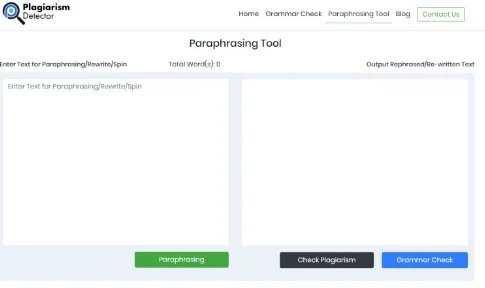
It may be cheating if a paraphrasing tool is used to merely change words or rearrange sentences without genuinely paraphrasing the original text.
Poor paraphrasing that does not accurately reflect the author’s comprehension of the subject can come from this.
Tools for paraphrasing might also be faulty and result in uncomfortable or inappropriate wording.
Using a paraphrasing tool without adequate editing and citation can result in plagiarism charges.
Paraphrasing tools should be used responsibly to ensure that the end product accurately captures the author’s ideas and comprehension of the subject matter, even though these tools can be useful for authors.
Frequently Asked Questions
No, paraphrasing is not considered cheating as long as the writer rephrases the original text in their own words and properly cites the source. However, poor paraphrasing or failure to properly cite the original source can lead to accusations of plagiarism.
While paraphrasing tools can be helpful, they should be used with caution. Relying solely on a paraphrasing tool to avoid plagiarism can be risky as it may produce poor paraphrasing that does not accurately reflect the writer’s understanding of the material.
To avoid unintentional plagiarism when paraphrasing, rephrasing the original text in your own words while retaining the original meaning is important. It is also important to properly cite the original source, even when paraphrasing.
Paraphrasing entire paragraphs or articles is not recommended, as it can lead to unintentional plagiarism. Instead, it is necessary to summarize the main points of the source material in your own words and properly cite the source.
Good paraphrasing should accurately reflect the text’s original meaning while using your own words and style. It should also be properly cited and distinguishable from the original source. Having someone else review your paraphrasing is recommended to ensure its quality.
